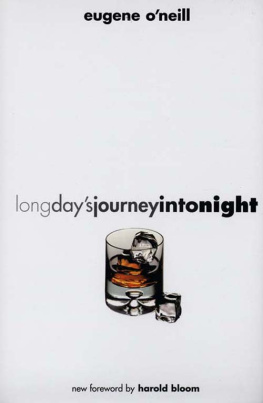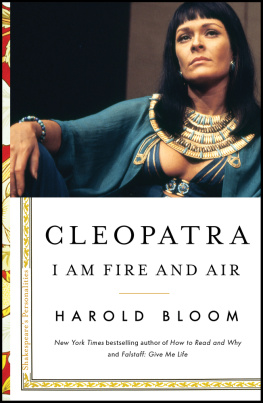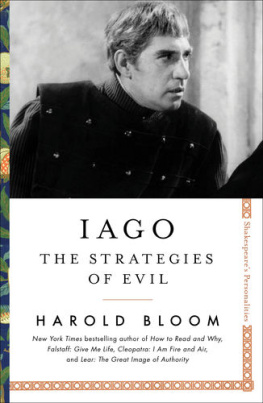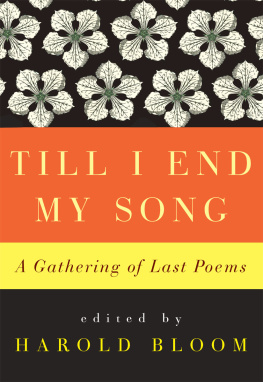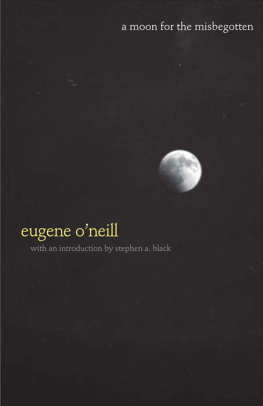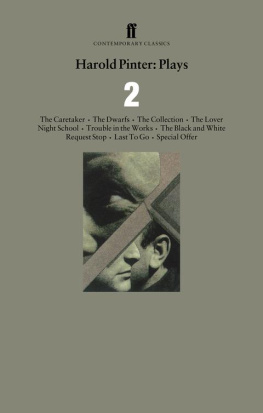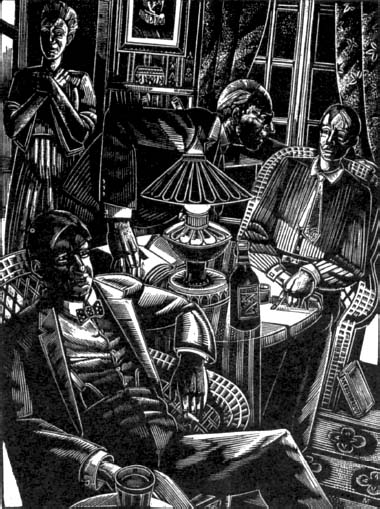L ONG D A YS
J OURNEY
INT O N IGHT
SECOND EDITION
E UGENE O NEILL
with a foreword by Harold Bloom
Yale University Press New Haven & London
First published as a Yale Nota Bene book in 2002.
Copyright as an unpublished work 1955 by Carlotta Monterey ONeill.
Copyright 1955 by Carlotta Monterey ONeill.
First published February 1956.
Copyright renewed 1984 by Yale University.
Corrected edition copyright 1989 by Yale University.
Foreword copyright 1987 by Harold Bloom. Foreword originally published in a slightly different version by Chelsea House in its Modern Critical Interpretation Series.
All rights reserved under International and Pan-American Copyright Conventions.
For information about this and other Yale University Press publications, please contact:
U.S. office
Europe office
Printed in the United States of America
Library of Congress control number: 2001097735
ISBN: 0-300-09410-8 (cloth)
ISBN: 0-300-09305-5 (pbk.)
10 9 8 7 6 5 4
CAUTION: Professionals and amateurs are hereby warned that Long Days Journey into Night, being fully protected under the copyright laws of the United States of America, the British Empire, including the Dominion of Canada, and all other countries of the copyright union, is subject to a royalty. All rights, including professional, amateur, motion picture, television, recitation, public reading, radio broadcasting, and the rights of translation into foreign languages, are strictly reserved. All inquiries regarding this play should be addressed to Cadwalader, Wickersham & Taft, Trustees of C. M. ONeill, One Wall Street, New York, N.Y. 10005.
THE EUGENE ONEILL COLLECTION was founded at the Yale University Library in 1931 by Carlotta Monterey ONeill. It includes notes, photographs, and the manuscripts of plays, among them LONG DAYS JOURNEY INTO NIGHT. All royalties from the sale of the Yale editions of this book go to Yale University for the benefit of the Eugene ONeill Collection, for the purchase of books in the field of drama, and for the establishment of Eugene ONeill Scholarships in the Yale School of Drama.
Frontispiece: Wood engraving by Michael McCurdy
Foreword
I
It is an inevitable oddity that the principal American dramatist to date should have no American precursors. Eugene ONeills art as a playwright owes most to Strindbergs, and something crucial, though rather less, to Ibsens. Intellectually, ONeills ancestry also has little to do with American tradition, with Emerson or William James or any other of our cultural speculators. Schopenhauer, Nietzsche, and Freud formed ONeills sense of what little was possible for any of us. Even where American literary tradition was strongest, in the novel and poetry, it did not much affect ONeill. His novelists were Zola and Conrad; his poets were Dante Gabriel Rossetti and Swinburne. Overwhelmingly an Irish-American, with his Jansenist Catholicism transformed into anger at God, he had little active interest in the greatest American writer, Whitman, though his spiritual darkness has a curious, antithetical relation to Whitmans overt analysis of our national character.
Yet ONeill, despite his many limitations, is the most American of our handful of dramatists who matter most: Williams, Miller, Wilder, Albee, Kushner, perhaps Mamet and Shepard. A national quality that is literary, yet has no clear relation to our domestic literary traditions, is nearly always present in ONeills strongest works. We can recognize Hawthorne in Henry James, and Whitman (however repressed) in T. S. Eliot, while the relation of Hemingway and Faulkner to Mark Twain is just as evident as their debt to Conrad. Besides the question of his genre (since there was no vital American drama before ONeill), there would seem to be some hidden factor that governed ONeills ambiguous relation to our literary past. It was certainly not the lack of critical discernment on ONeills part. His admiration for Hart Cranes poetry, at its most difficult, was solely responsible for the publication of Cranes first volume, White Buildings, for which ONeill initially offered to write the introduction, withdrawing in favor of Allen Tate when the impossibility of his writing a critical essay on Cranes complexities became clear to ONeill. But to have recognized Hart Cranes genius, so early and so helpfully, testifies to ONeills profound insights into the American literary imagination at its strongest.
The dramatist whose masterpieces are The Iceman Cometh and Long Days Journey into Night, and, in a class just short of those, A Moon for the Misbegotten and A Touch of the Poet, is not exactly to be regarded as a celebrator of the possibilities of American life. The central strain in our literature remains Emersonian, from Whitman to our contemporaries like Saul Bellow and John Ashbery. Even the tradition that reacted against Emersonfrom Poe, Hawthorne, and Melville through Gnostics of the abyss like Nathanael West and Thomas Pynchonremains always alert to transcendental and extraordinary American possibilities. Robert Penn Warren must be the most overtly anti-Emersonian partisan in our history, yet even Warren seeks an American Sublime in his still-ongoing poetry. ONeill would appear to be the most non-Emersonian author of any eminence in our literature. Irish-American through and through, with an heroic resentment of the New England Yankee tradition, ONeill from the start seemed to know that his spiritual quest was to undermine Emersons American religion of self-reliance.
ONeills own Irish Jansenism is curiously akin to the New England Puritanism he opposed, but that only increased the rancor of his powerful polemic in Desire under the Elms, Mourning Becomes Electra, and More Stately Mansions. The Will to Live is set against New England Puritanism in what ONeill himself once called the battle of moral forces in the New England scene" to which he said he felt closest as an artist. But since this is Schopenhauers rapacious Will to Live, and not Bernard Shaws genial revision of that Will into the Life Force of a benign Creative Evolution, ONeill is in the terrible position of opposing one death-drive with another. Only the inescapable Strindberg comes to mind as a visionary quite as negative as ONeill, so that The Iceman Cometh might as well have been called The Dance of Death, and Long Days Journey into Night could be retitled The Ghost Sonata. ONeills most powerful self-representationsas Edmund in Long Days Journey and Larry Slade in Icemanare astonishingly negative identifications, particularly in an American context.
Edmund and Slade do not long for death in the mode of Whitman and his descendantsWallace Stevens, T. S. Eliot, Hart Crane, and Theodore Roethkeall of whom tend to incorporate the image of a desired death into the great, triple trope of night, the mother, and the sea. Edmund Tyrone and Larry Slade long to die because life without transcendence is impossible, and yet transcendence is totally unavailable. ONeills true polemic against his country and its spiritual tradition is not, as he insisted, that its main idea is that everlasting game of trying to possess your own soul by the possession of something outside it." Though uttered in 1946, in remarks before the first performance of The Iceman Cometh, such a reflection is banal and represents a weak misreading of The Iceman Cometh. The plays true argument is that your own soul cannot be possessed, whether by possessing something or someone outside it, or by joining yourself to a transcendental possibility, to whatever version of an Emersonian Oversoul that you might prefer. The United States, in ONeills dark view, was uniquely the country that had refused to learn the truths of the spirit, which are that good and the means of good, love and the means of love, are irreconcilable.

